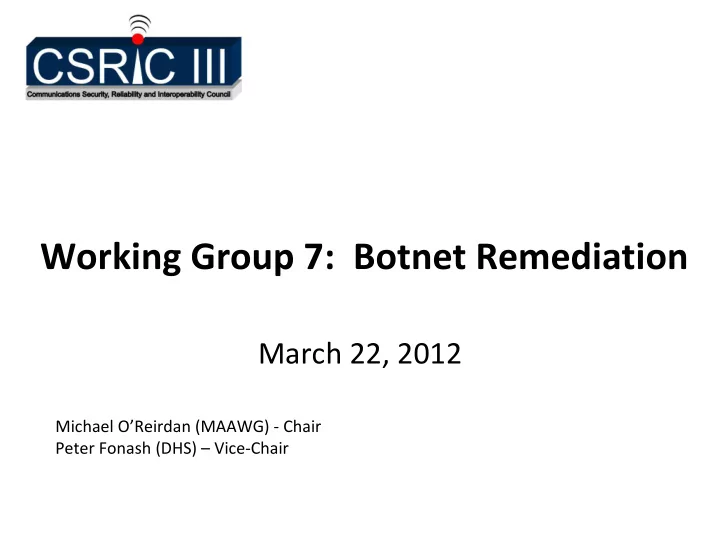

Working Group 7: Botnet Remediation March 22, 2012 Michael O’Reirdan (MAAWG) ‐ Chair Peter Fonash (DHS) – Vice ‐ Chair
WG 7 Objectives Working Group 7 – Botnet Remediation Description: This Working Group will review the efforts undertaken within the international community, such as the Australian Internet Industry Code of Practice, and among domestic stakeholder groups, such as IETF and the Messaging Anti ‐ Abuse Working Group, for applicability to U.S. ISPs. Building on the work of CSRIC II Working Group 8 ISP Network Protection Practices, the Botnet Remediation Working Group shall propose a set of agreed ‐ upon voluntary practices that would constitute the framework for an opt ‐ in implementation model for ISPs. The Working Group will propose a method for ISPs to express their intent to op ‐ into the framework proposed by the Working Group. The Working Group will also identify potential ISP implementation obstacles to the newly drafted Botnet Remediation business practices and identify steps the FCC can take that may help overcome these obstacles. Finally, the Working Group shall identify performance metrics to evaluate the effectiveness of the ISP Botnet Remediation Business Practices at curbing the spread of botnet infections. 2
WG 7 Members Name Organization Name Organization Name Organization Michael O'Reirdan MAAWG Adam O'Donnell Sourcefire Brian Done DHS (Chair) Daniel Bright EMC Inc Alfred Huger Sourcefire Peter Fonash DHS Greg Holzapfel Sprint Kurian Jacob FCC (Vice Chair) Vern Mosley FCC James Holgerson Sprint Robert Thornberry (Editor) Alcatel-Lucent Bill McInnis IID Michael Fiumano Sprint Alex Bobotek AT&T Maxim Weinstein StopBadware Chris Sills IID John Denning Bank of Amer. Tim Rohrbaugh Intersections Tice Morgan T-Mobile Neil Schwartzman John Griffin TCS Barry Greene ISC (Secretary) CAUCE Chris Roosenraad TWC Merike Kaeo ISC Michael Glenn CenturyLink Kevin Sullivan Microsoft Joe St Sauver Paul Diamond (Glossary) Univ of Oregon/ Jon Boyens NIST (Editor) CenturyLink Internet 2 Craig Spiezle OTA Jay Opperman Comcast Robert Mayer USTelecom Assoc. Bill Smith PayPal Matt Carothers Cox Eric Osterweil Verisign Gabe Iovino REN-ISAC Gunter Ollmann Damballa John St. Clair Verizon Johannes Ullrich SANS Institute Timothy Vogel Verizon 3
Work Plan Phase 1: Based on CSRIC II output, MAAWG recommendations and IETF draft, produce initial Code of Conduct ‐ March 2012 Phase 2: Identify Barriers to Code Participation ‐ September 2012 Phase 3: Develop Bot Metrics ‐ December 2012 4
Status Phase 1: U.S. Anti ‐ Bot Code of Conduct (ABCs) for Internet Service Providers (ISPs) completed 5
U.S. Anti ‐ Bot Code of Conduct • Voluntary U.S. Code provides an initial framework for ISPs to better understand and help address the bot issue • Objective of Code is to encourage ISPs to participate in each of the following activities: – end ‐ user education to prevent bot infections, – detection of bots, – notification of potential bot infections, – remediation of bots, and – collaboration and sharing of information. 6
U.S. Anti ‐ Bot Code of Conduct (cont.) • Implementation of the Code guided by the following principles: – Voluntary – encourages voluntary types of actions to be taken by ISPs – Technology Neutral – does not prescribe particular means or methods – Approach Neutral – does not prescribe any particular approach – Respect for Privacy – address privacy issues in accordance with laws – Legal Compliance – address other areas in accordance with laws – Shared Responsibility – other Internet ecosystem participation needed – Sustainability – ISP activities should be cost ‐ effective and sustainable – Information Sharing – ISPs share lessons ‐ learned with other stakeholders – Effectiveness – encourages ISP activities that are appropriate and effective – Effective Communication – ISP communication with customers easily understood and accessible by the recipients 7
WG7 Recommendations • Working Group 7 recommends actions that ISPs offering residential broadband Internet access may take if they choose to adopt the Code • Working Group 7 further recommends ISPs and other service providers indicate their agreement to participate in the voluntary Code by contacting the entity of their choice, or self ‐ asserting on their company webpage 8
Next Steps • Determine long ‐ term administration of Code participation • Begin Phase 2 ‐ Identification of Barriers to Code Participation • Phase 3 – Develop bot Metrics ‐ started 9
Recommend
More recommend